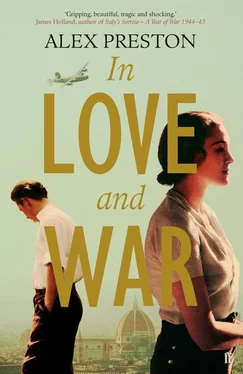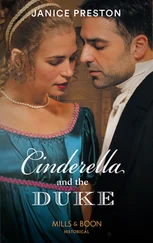It had been Ada’s idea to sleep up here, the eaves which had been Alice Keppel’s studio during a brief painting fit in the early ’30s. It is large, light, fluttering with doves that roost in soft dun clumps on the roof. This is the sound of their life now: the burble of doves, the wind, the hiss and hum of the radio on the desk by the window. He looks down at her, the hair falling across the pillow, sleep-creases on her face. Against the wall at the end of the bare mattress, stand the three paintings of the triptych. She loves this, she says, almost as much as Anna’s collage of photographs, which hangs beside it.
‘Today’ she says, eyes opening, ‘we go to the sea.’ He doesn’t reply, but stoops to scratch Tatters behind the ear.
‘ Vieni qui. ’ She rises and draws him and the dog towards her.
‘The bonfire was a risk,’ he says in her ear.
They’d waited until late twilight, when the air around them was violet and the smoke from their little pyre might drift unnoticed. It had seemed important, somehow, to have a fire, to match his mother’s, six years ago, on the icy Shropshire field. They’d lit it down by the swimming pool, a small pile of sticks on the flagstones, brightening the dodos’ patient vigil over the pool. It flared higher as page after page of In Love and War was fed into it.
Ada’s idea. She’d read the novel in an armchair in the drawing room, hair tied up and a pencil in her teeth, marking the margins, adding a question mark here and there. She’d sipped nettle tea and hummed to herself as she went with Hulme from London to the trenches. When she finished, she sat for a long time, cross-legged in the armchair.
‘It’s no good,’ she said, finally, firmly. ‘Don’t look at me like that. You write well — I like so many passages, so many individual images and phrases.’ She got up to stand beside him at the drawing room window. ‘You began to write too early, I think,’ she’d said softly. ‘You’ve watched other people living without coming alive yourself. What I read here, it feels— like the difference between orzo coffee and the real thing. What do the Germans call it? Ersatz? ’
He nodded his head and looked glumly out. She took his hands in hers, cold and bony.
‘And you’re one of us, Esmond,’ she said. ‘You don’t want the world to see you through the lens of a book like this. You’ll live a long life, write many great novels, but you’ll be followed by this piece of Fascist propaganda—’ He bristled and tried to pull his hands away but she’d held onto them. ‘However well written. You don’t want our children to read this, to know their father ever thought this way. You’ve outgrown the thing. The truth is, Esmond, you don’t need to answer to your family, to Mosley, any more. You’re your own man now.’
After the fire, he sat up late with the triptych, candlelight on the faces and then on Ada’s sleeping beside him, her eyelids trembling softly under the spell of some dream, her breath quickening and slowing. He let his mind spool into memory before the eerie green of the triptych, Florence concentrated in the layers of paint, the wandering tresses of Mary Magdalene’s hair, the sinews and tendons and bones of the Christ.
After Bailey’s arrest, Esmond and Goad had made their way together to the via Zara for their meeting at the Questura. Count Gaetano, the Podestà, was also there, looking sheepish. Goad gave quiet, precise answers to their questions. Esmond had tried to ask about Bailey, but the Quaestor, alcohol-flushed, held up his hand.
‘There is a Red Cross boat to Southampton from Genoa in three days. You must be on it. If not, you will join your friend, the priest, breaking stones in the south.’
That evening, Esmond had packed clothes, his bundle of correspondence and his novel in a morocco travelling case, wrapped Anna’s collage in brown paper and closed up the studio. With Tatters at his heels, he walked out of the wicket gate, locking it behind him. He and Goad were booked on a train at eleven the next morning, a change at Pisa and then up the coast to Genoa. As the city’s many bells tolled nine, he stood in the middle of the Ponte Santa Trinità, a golden moon rising to the east. To leave all of this behind. He remembered walking across the quad with Blacker after being discovered with Philip. Here, again, he’d found love and was being expelled.
He lit a cigarette, tossing the match into the water. The moon caught the lips of waves in the river and was carried on them downstream before slipping into darkness. He patted the parapet wall and moved off. He turned right along the Lungarno, past where he’d kissed Gerald a year and a half earlier, still a boy, he realised, thinking of his young, unhappy self. Up through the arcade of the Uffizi and into the Piazza della Signoria, the perfect centre of the human world . He passed a sandbagged David , sheltered under wood, nodded at him and wended his way up past the Bargello into the warren of streets he now knew better than any. He was a Florentine, he realised, more at home here than anywhere.
Ada was waiting at the balcony, looking down at the square. She stood on tiptoes when she saw him, then disappeared and ran out of the front door of the apartment and across the street into his arms. He held her against him, and they couldn’t breathe with the force of it, and he felt that, if he could manage not to tell her, not to say that this was their last night together, it might not have to be true.
They sat in the drawing room. She’d understood without words. They talked, sank to the floor and made love very slowly, looking out at the moon-gold trees. He held her head in his hands, covering her pale face with kisses. Tatters trotted from room to room, then found a corner to sleep in and began to snuffle and twitch. Esmond and Ada did not sleep. Only when he handed her Anna’s collage did she begin to cry. At eight they walked down to a café on the via della Piazzuola. They fed Tatters pastries under the table, held hands, regretted each sip of coffee, as if by keeping their cups full they might halt time. One last kiss on the corner of the street and then Esmond left, his tears not coming until he’d arrived at the station.
Six Blackshirts, including Carità, were there to see them off. A look of triumph as Goad and Esmond climbed up into their compartment. Carità came right up to the window, rapped on it three times and waved. As the train pulled out, beginning a long arc towards Pisa, Esmond could still see him on the platform, in his shorts, walking with a little bounce and grinning. Goad came and sat next to Esmond and put an arm around his shoulders, but the tears had passed, and he felt something else. The day was hot, the train kept stopping and starting, fishermen lolled by the side of the Arno.
On the outskirts of Pisa, outskirts Esmond recognised with a swell of distress as the same ones he’d driven through the night of Fiamma’s death, the train halted again. Almost without thinking, not giving himself time to change his mind, Esmond stood up.
‘I’m going back,’ he said to Goad.
The older man looked at him through his spectacles, before nodding.
‘Will they be looking for us here at Pisa? Or not until Genoa?’
Goad thought for a moment. ‘I’d guess Genoa. It will give me time to come up with a convincing — hum — canard.’ He rose and took Esmond by the hand. ‘Good luck. You’d better get moving.’
The train gave a creak and began to chunter forward. Esmond went into the corridor, reached out of the window, opened the door and leapt down the embankment, tumbling with his case into some thorny bushes, tearing his trousers and opening cuts on his cheeks and hands. He looked up in time to see Goad leaning out of the window, waving discreetly, but furiously.
Читать дальше












